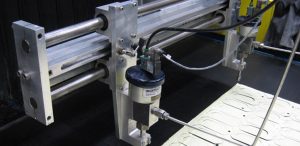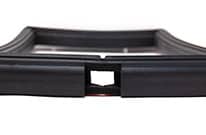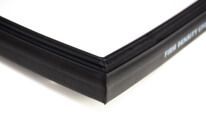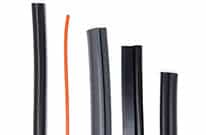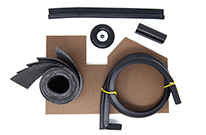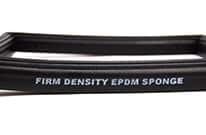 In this case study, you’ll learn how Elasto Proxy applied its expertise in technical design, compound selection, and custom fabrication to replace the thermal acoustic insulation in the engine bays of military vehicles. How can we help you solve your sealing and insulation challenges? Contact us.
In this case study, you’ll learn how Elasto Proxy applied its expertise in technical design, compound selection, and custom fabrication to replace the thermal acoustic insulation in the engine bays of military vehicles. How can we help you solve your sealing and insulation challenges? Contact us.
When a manufacturer of military vehicles isn’t satisfied with a product design, more than just the bottom line is at stake. For coalition forces in Iraq and Afghanistan, armored fighting vehicles provide mission-critical force protection. Most military observers focus on features like the steel plating and the guns, but this type of vehicle won’t deploy anywhere without a big diesel engine under the hood.
In military vehicles such as armored personnel carriers, diesel engines run hot and loud. Without engine bay insulation, this heat and noise could put both the powerplant and military personnel at risk. Thermal acoustic insulation must also meet flame, smoke, and toxicity (FST) standards. In addition, engine bay insulation must withstand vehicle wash-downs and exposure to detergents and other cleaning chemicals.
Technical Design and Military Vehicles
 As the manufacturer of military vehicles explained to Elasto Proxy, power washing had become especially problematic. The engine bay insulation, a regular polyurethane foam with a heat-resistant Mylar facing, proved unsuitable for hose downs. The defense manufacturer wanted to replace this thermal acoustic insulation, but still needed to meet all of its other application requirements.
As the manufacturer of military vehicles explained to Elasto Proxy, power washing had become especially problematic. The engine bay insulation, a regular polyurethane foam with a heat-resistant Mylar facing, proved unsuitable for hose downs. The defense manufacturer wanted to replace this thermal acoustic insulation, but still needed to meet all of its other application requirements.
That’s when Elasto Proxy’s technical design team applied its expertise in building “insulation sandwiches” from thermal and acoustic materials. By using foams, fillers or barrier materials, and adhesives, Elasto Proxy can design custom insulation that dissipates heat, quiets noise, and even dampen vibrations. The specialty insulation we can create is ideal for engine bays, but that’s not where our expertise ends.
Compound Selection for Thermal Acoustic Insulation
During compound selection, technical buyers and product designers may be challenged by the many different choices for insulating materials. For example, do you need ether, ester, polyurethane, Triamid, or silicone foam? If so, which grade or type will meet your requirements? With insulation sandwiches, which type of adhesive meets FST requirements and can handle exposure to cleaning chemicals?
In the case of the defense industry manufacturer, Elasto Proxy researched the available materials and recommended a high-temperature silicone foam with acoustical properties. The laminated facing material that we selected was specialized, and resisted engine-cleaning chemicals. Armed with expert technical design and compound selection, the vehicle manufacturer’s mission now became custom fabrication.
Custom Fabrication for the Defense Supply Chain
 Initially, the military vehicle manufacturer just wanted some sample parts. That’s where Elasto Proxy’s water jet capabilities saved time and money. Unlike die cutting, water jet cutting doesn’t require metal dies or expensive setup charges. This makes water jet cutting ideal for parts prototyping and low-to-medium volume parts manufacturing.
Initially, the military vehicle manufacturer just wanted some sample parts. That’s where Elasto Proxy’s water jet capabilities saved time and money. Unlike die cutting, water jet cutting doesn’t require metal dies or expensive setup charges. This makes water jet cutting ideal for parts prototyping and low-to-medium volume parts manufacturing.
Water jet cutting is great for rubber and plastic, but also works well with thermal and acoustic foams. The high pressure heads in our water jet machine enable Elasto Proxy’s skilled production personnel to cut multiple sheets or parts at the same time. Our custom fabrication expertise also extends to adhesive bonding. From insulation sandwiches to taped gaskets, we supply sealing and insulation that sticks.
How Can We Help You?
For the manufacturer of military vehicles, partnering with Elasto Proxy meant more than just solving their problem with thermal acoustic insulation. Since then, we’ve helped this defense industry leader with cost-effective redesigns for new military contracts and space restrictions. Today, the military vehicles that we help keep cool and quiet are used by Canada, the United States, and several other countries.
Does your business serve the defense industry? How can Elasto Proxy help solve your sealing and insulation challenges?



